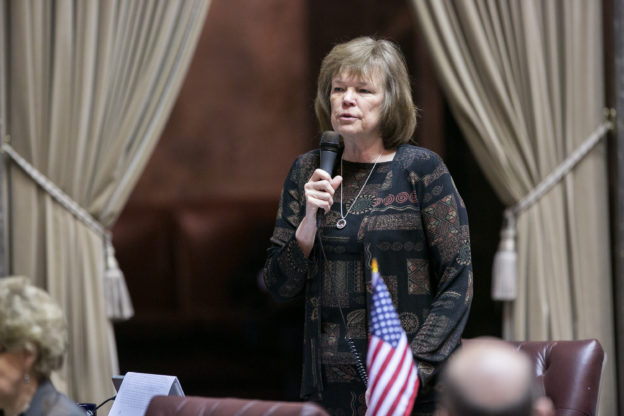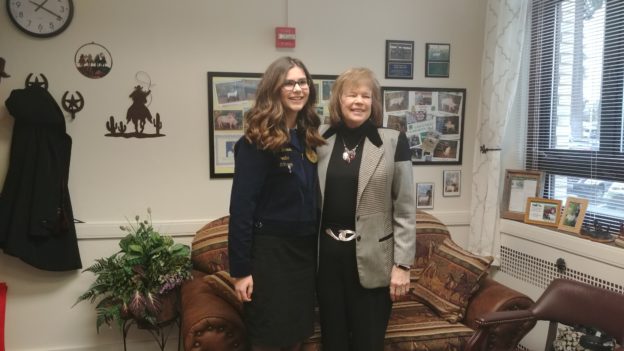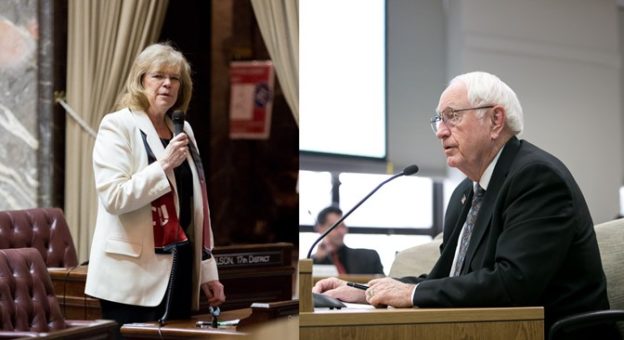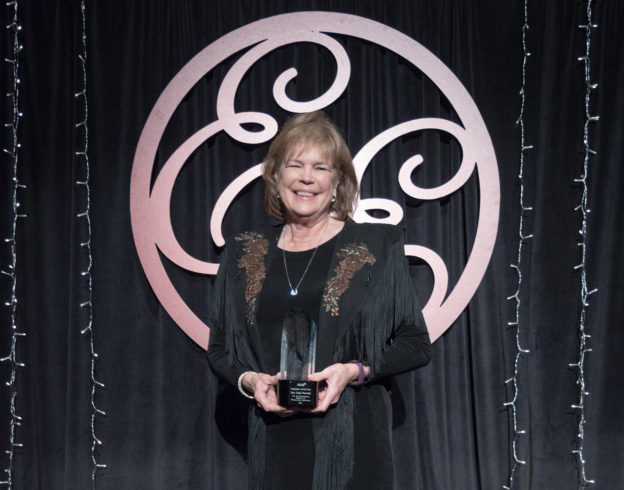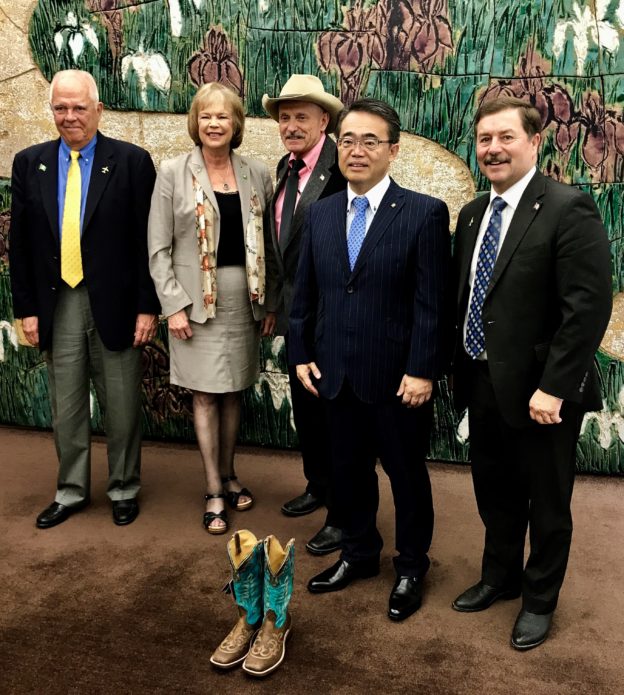
February 14, 2018 |
|||
Share my E-newsletterDue to election year restrictions, I will be limited in how I can communicate with you about what is going on in Olympia. Please be sure to subscribe to my newsletter if you already haven’t. Visit my website by clicking here and sign up to receive future e-newsletters! You can also unsubscribe at anytime by clicking here. Do you know others who live in our district who may not be receiving my e-news updates? Please forward this e-mail invitation to them or click on the share button below. 

|
Author Archives: Laudan
Bipartisan legislation establishing a new statewide Tourism Marketing Authority (WTMA) passed the Washington state Senate Saturday.
The bill would direct the group to develop and implement a tourism-marketing plan to drive tourism dollars to all parts of the state.
“The natural and diverse beauty found in every corner of Washington, from Wahkiakum to Pend Oreille, is unrivaled,” said Sen. Dean Takko, D-Longview and sponsor of Senate Bill 5251. “The economic boom in the Puget Sound continues to bring in new residents and visitors from around our country and the world. This legislation will encourage our new neighbors, and many more, to explore the wonders of our state, all the while bringing much-needed dollars into rural communities.”
Washington state closed its tourism office in 2011 to cut costs during the Great Recession. Currently, Washington is the only state in the country without a coordinate tourism program.
“Our state has so much to offer when it comes to tourism opportunities,” said Warnick, R-Moses Lake. “Tourism done this way is an export that benefits local communities directly. It benefits small retailers, outdoor recreation, state parks, and ultimately the taxpayers of Washington. This is an innovative way for the private sector and government to collaborate and bring needed investment to all areas of our state.”
The WTMA would be funded by directing 0.2 percent of retail sales taxes collected on lodgings, car rentals, and restaurants.
SB 5251 passed out of the Senate on a unanimous vote and now moves to the House of Representatives for consideration.
A bill sponsored by Sen. Judy Warnick, R-Moses Lake, to help the next generation of agriculturists educate their communities was approved by the Senate Agriculture, Water, Natural Resources and Parks Committee Thursday.
The legislation, Senate Bill 6571, would provide a sales and use tax exemption to student members of agricultural education organizations like the Future Farmers of America.
“Education about agriculture is important,” said Warnick, the former chair of the Senate’s ag-related committee. “More urbanization often means more people are disconnected from where their food comes from, and the work these students are doing is a benefit to our entire state. Removing taxes on products they use in a very limited way to promote our next generation of farmers and business leaders will go a long way.”
Warnick constituent Hannah Warwick, a junior at Davenport High School and FFA student, came to Olympia to testify on the bill, which received a public hearing Thursday prior to its passage by the committee.
“Raising livestock can be very expensive and every penny counts,” said Hannah Warwick. “This bill would be perfect to help members with the financial aspect of raising livestock. On average, a show steer will consume one and a half tons of grain prior to a show. I spent $567 on grain, of that $43.65 was sales tax. That may not seem like a lot, but everything adds up.”
Hannah Warwick noted that many FFA students work odd jobs to afford this hands-on experience.
“I’m grateful my colleagues from around the state see the value in this legislation,” said Sen. Warnick. “These students learn so many valuable skills such as leadership, public speaking and the ins and outs of an agriculture business. Agriculture is a significant contributor to our economy and these future leaders will be needed.”

 |
Share my E-newsletterDue to election year restrictions, I will be limited in how I can communicate with you about what is going on in Olympia. Please be sure to subscribe to my newsletter if you already haven’t. Visit my website by clicking here and sign up to receive future e-newsletters! You can also unsubscribe at anytime by clicking here. Do you know others who live in our district who may not be receiving my e-news updates? Please forward this e-mail invitation to them or click on the share button below.
 Greetings Friends and Neighbors,We have finished the third week of the 2018 legislative session. Given the short, 60-day time frame, things are moving fast. I am glad that we have finally garnered a significant win for rural Washington on the Hirst, household well issue. Late last week, we approved a compromise bill that the governor has signed. It creates a framework for local control over water resources, plans for the future and importantly provides clarity on permit-exempt wells so that families that simply need water for a home can get it. The media and urban lawmakers have been displeased about the connection between Hirst and the Capital Budget. Let me be clear, without that linkage, urban lawmakers would have been content with doing nothing to solve this problem. Borrowing money to grow government while rural Washingtonians’ property values plummet and economic development grinds to a halt seemed unfair to taxpayers. With the approval of a Hirst fix, the Capital Budget was also adopted allowing for investment in community projects. Our caucus knew that some sort of investment would be needed in the Capital Budget to address the fallout from the Hirst decision. We needed a policy before we knew that dollar figure. However, the position of some that there is no connection was disingenuous. The framework that the Democrats unveiled in late December made the connection explicit. Without hundreds of millions of dollars in the Capital Budget, the underlying water policy was void. You can read my press release on the Hirst fix and Capital Budget by clicking here.  Video UpdatePlease take a moment to watch my latest video update where I discuss what’s going on in Olympia and what I am working on. Click here or on the image below to watch.
 My billsI have introduced several bills this session ranging from seed certification to funding for agricultural fairs and expanding opportunities for retirement benefits of veterans. Please click here to see a list of bills that I have sponsored.  It is an honor to serve as your state Senator. Please do not hesitate to reach out to my office with any questions or concerns you may have regarding your state government.
Judy Warnick, Your State Senator  Contact MeOlympia Office:103 Irv Newhouse Bldg. P.O. Box 40410 Olympia, WA 98504
Staff:Legislative Assistant – Breanne Elsey Session Aide – Charlie Kirry Intern – Cynthia Banuelos Olympia Phone:360.786.7624
District Phone:509.766.6505
E-mail:
Website: |
Capital budget approved; provides unprecedented support for education
After nearly a year of negotiations, Sen. Judy Warnick, former chair of the Senate’s water-related committee and lead negotiator on the bill to fix the flawed Hirst court decision, believes the compromise deal reached this week by Senate and House negotiators will finally bring needed relief for rural families seeking to drill a small household well.
“It has been an arduous and complex negotiation,” said Warnick, R-Moses Lake. “I believe that the compromise we have reached meets the criteria that I stated at the end of last year, namely that any solution must not be a burden on rural families who simply need water to build a home.”
Sen. Shelly Short, R-Addy, joined Warnick in the negotiation talks.
“We had many hours of meetings that went late into the night over this week,” Short said. “Our stance from the beginning was that we needed a bill that would treat our rural landowners fairly so they can drill water wells on their land. Without water, landowners can’t develop their property. The compromise we reached isn’t a perfect fix to the problem, but it’s a solution that allows locally driven plans with flexibility to develop solutions tailored to meet local needs.”
“It has taken us this long to get here because many in Olympia didn’t take the plight of rural Washington seriously,” Warnick said. “We did what we had to do to represent our constituents and get the attention of urban lawmakers who don’t need to worry about where their water comes from.”
Engrossed Substitute Senate Bill 6091, sponsored by Sen. Kevin Van De Wege, D-Sequim, and Warnick, passed the Senate 35 to 14 and the House of Representatives 66 to 30.
“I’m glad that Senator Van De Wege stepped up and supported our efforts to help rural families,” said Warnick. “This is an example of collaboration among Democrats and Republicans to work for all of Washington.”
Senate Republican leaders had insisted since early April, 2017 that there would be no new capital budget without a long-term remedy for the effects of the Hirst ruling. Adoption of the Hirst fix cleared the way for the Legislature to adopt the state’s capital budget.
“This budget is designed with Washington students in mind,” said Sen. Jim Honeyford, R-Sunnyside and the lead Senate Republican for the capital budget. “It invests an historic level of support for K-12 reforms.
“In addition to education, we prioritize projects that focus on helping meet our state’s mental-health needs, mitigate the damage of environmental disasters and preserve and develop existing properties – all while leaving capacity in the budget to address unforeseen future needs.”
The $4.2 billion spending plan for funding capital assets like school-building construction and mental-health facilities during the 2017-19 biennium, includes a total of more than $1 billion K-12 education-facility construction, renovation or modernization.
The capital budget includes $860 million in total appropriations for higher-education facilities, including $489 million in general-obligation bonds. Of the total spending authority, $433 million would go to the community and technical college system and $428 million to Washington’s public four-year institutions.
The state’s water needs are also an area of emphasis. The budget contains $160 million for flood-control and water-supply projects, and well as $165 million for drinking-water loans and grants, $220 million for the Water Pollution Control Revolving Program and $35 million for the Centennial Clean Water Program. It also contains $300 million for Hirst-related projects.
Mental-health needs, another priority for Senate Republicans, would receive $132 million in the budget. There is approximately $90 million in community behavioral health projects and another approximately $42 million in state hospital projects.
Other highlights of the capital budget include:
- $97 million to fund the current Public Works Assistance Account list in its entirety;
- $8 million for Community Economic Revitalization Board (CERB) grants;
- Nearly $100 million for affordable housing, including $12 million for innovative housing projects;
- $80 million for select Washington Wildlife Recreation Program projects; and
- $13 million for forest-hazard reduction.
The capital budget passed the Senate 49-0 and the House 95-1
Senators Judy Warnick and Jim Honeyford welcomed news that House Democrats have planned a work session Dec. 12 to discuss the Hirst water rights court decision.
“I have remained hopeful since the Legislature adjourned that we can deliver a Hirst fix for rural Washington,” said Warnick, R-Moses Lake, who sponsored Senate Bill 5239, the only Hirst–related bill to receive a bipartisan vote during the 2017 legislative session.
“While serving as chair of the Senate’s water committee, I knew early on how important this court ruling was and the negative impact it would have on rural Washington. We needed a fix then, and need one now. If we had not kept the pressure up, this conversation wouldn’t be happening. I’m pleased the House is finally taking this seriously and look forward to seeing what the committee comes up with,” Warnick added.
This year Senate Republicans refused to move forward with final passage of a capital budget, after months of negotiations ended with House Democrats refusing to vote on any solution to address the issue of water rights and rural development in response to the state Supreme Court ruling known as the Hirst decision.
“It was clear to Senate Republicans coming into the 2017 session that fixing Hirst was a priority,” said Honeyford, R-Sunnyside and a member of the Senate Agriculture, Water, Natural Resources and Parks Committee. “Unfortunately, what also became clear is that House Democrats were more than willing to ignore what they viewed as solely a rural issue.
“Some criticized us for tying the Hirst fix to the capital budget, but we needed to get their attention, and spur them to some action,” Honeyford added. “I am pleased that our colleagues in the House have now acknowledged that addressing water rights and rural development should be a priority of the session, and I look forward to working with them to find a solution that works for all of Washington.”
The Association of Washington Business recently honored Sen. Judy Warnick, R-Moses Lake, at its 2017 Evening of Excellence as the Legislator of the Year.
Warnick, who served as the Chair of the Senate’s Agriculture, Water, Trade and Economic Development Committee, received the award for her work to support small businesses across the state.
“I am honored to receive this recognition,” said Warnick. “I have worked to expand opportunity and limit unnecessary regulations that hurt small businesses, which are a key driver of our state’s economy, especially in small and rural communities.”
In addition to her support of small business, Warnick’s advocacy for a permanent fix to the Hirst water rights court decision for rural Washington families earned her the top honor by the business association.
“When the 2017 legislative session started, I knew that the Hirst ruling was going to be a significant issue,” Warnick said. “While we had work to do to address education, rural families and local governments needed a permanent fix to Hirst – something I am still fighting for. Ensuring families have access to water in my community is critical for continued economic development in parts of our state that haven’t seen the same kind of economic recovery enjoyed by those in the greater Puget Sound.”
“Senator Warnick has been instrumental in advocating on behalf of residents in rural regions across the state – from water issues to economic growth – not just this year, but for many years as a board member and a legislator,” said Gary Chandler, AWB vice president, government affairs. “We are pleased to give her this year’s Legislator of the Year award as a way to recognize all the great work she has done to improve communities, large and small, and create economic opportunity.”
Sen. Judy Warnick, who chairs the Senate’s economic development-related committee, says a recent trade mission that took her, Rep. Tom Dent, and other local officials to Japan laid important groundwork for what she hopes will be improved trade relations and increased economic collaboration.
“Our legislative district is very attractive to companies in Japan,” stated Warnick, R-Moses Lake. “We offer inexpensive power, a strong skilled workforce and the willingness to be a strong international trade partner. Our agricultural industry is a cornerstone in that relationship with wheat and other crops grown in our district for export. I am committed to increasing those ties and looking for opportunities to support our growing economic cooperation. In terms of furthering the relationships that result in those opportunities, our mission was a success.”
The nine-day tour included meetings with Hideaki Ohmura, governor of Aichi Prefecture – a state with an economic and geographical makeup similar to Washington – plus numerous businesses around Nagoya, Osaka and Tokyo. Rep. Dent and Sens. Warnick and Schoesler presented Governor Ohmura with a pair of cowboy boots as a gift.
Dent feels the collaborative mindset and positive attitudes on the trip was energizing and will be valuable moving forward.
“Our mission was to foster and strengthen relationships with the Japanese people, to share ideas and work together into the future. We were able to see many aspects of why their economy is thriving. At the same time, we were able to have a great dialogue about the benefits of doing business in the 13th Legislative District and Washington State. It is important they continue to look favorably upon us as a strong partner in key industry sectors such as aerospace and advanced manufacturing,” said Dent, R-Moses Lake.
The 13th District, which covers much of central Washington, is already home to a number of Japanese companies. The lawmakers were particularly glad to meet with the leaders of a parent company operating in Moses Lake that is interested in expansion efforts at the local port.
Senate Majority Leader Mark Schoesler, who serves the neighboring 9th Legislative District viewed it as time very well spent.
“Seeing how the governor vetoed the legislation we passed to encourage manufacturing across the state, it’s clear that homegrown efforts like this are incredibly important for preserving rural jobs in the short term and attracting new investments for the long term,” said Schoesler, R-Ritzville.
“There is nothing like meeting face-to-face when it comes to doing business, whether it’s in the next county or a continent away,” he added. “Our Japanese hosts were very gracious and receptive to our delegation, and I believe they were truly impressed with the amount of time and energy we were willing to devote to the tour.”
“I have done some international travel, but this trip was so inspiring,” said Warnick. “I was overwhelmed by the hospitality and the willingness of businesses to open their operations to us to demonstrate new technologies and manufacturing processes. It can only help enhance opportunities for increased partnerships in the 13th District and across Washington State.”
In addition to business discussions, the legislators were able to participate in broader cultural exchanges, visiting historic temples and treasured old-growth forests, and traveling by high-speed rail to view Japan’s diverse geography.
“One thing that sticks out from my travels across Japan is how clean everything was,” said Warnick. “The subway stations, large cities were free from litter and other sights you’d associate with large metropolitan areas. I was honored to spend time there learning, and look forward to a continued vibrant economic and cultural exchange.”
“The innovation and the factories were amazing, but as we toured these places and even the retail stores, you could sense the work ethic and the pride the young people took in their job. It was impressive to see how proud they were of what they were doing and where they worked. It was great to see,” Dent said.









 Greetings from Olympia,
Greetings from Olympia,  Higher costs to heat your home and fill your gas tank
Higher costs to heat your home and fill your gas tank Visit Washington!
Visit Washington!
